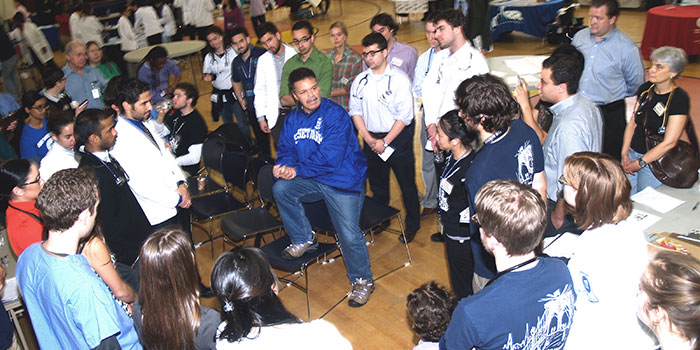
To Learn. To Search. To Serve. There is, perhaps, no better way to envision the ideals etched in the SUNY seal than to discuss the vibrant citizenship of SUNY students, faculty, and staff. Civic engagement suggests an intentional focus on one’s social and political responsibilities stemming from a deep understanding of how citizens convene using democratic principles to imagine a fairer, smarter, and better world. Many SUNY campuses house centers or programs for civic engagement, and an increased civic pride, self-efficacy, and deeper interest in learning have all been cited as positive outcomes of service-learning and community service student experiences. Here are a few guidelines to get you started on your way to becoming a responsible and engaged citizen this semester!
- Educate yourself on democratic principles and practices. Do you have a policy or American history class in your schedule? Try broaching the topic in your class to foster a larger conversation with your peers, or visit the office on your campus that houses civic engagement, service-learning and/or other volunteer projects. Trainings for holding public deliberation are available to students, as are friendly and knowledgeable faculty and staff.
- Learn about social issues. You can even take a class; it will not only allow you to discuss hard-hitting topics in a judgment-free space, but instructors will keep you focused and teach you things about history and common policy that you might not otherwise learn.
- Locate yourself socially. Historically, groups have been privileged or marginalized based on age, race, socioeconomic background, geographic location and many other intersecting factors. Understanding the intersections of these factors can help you more eloquently express your interests in social and political movements and will help you develop a deeper understanding of, and commitment to, your own civic responsibility.
- Be a responsible citizen. Civic pride instills a responsibility to serve, work collaboratively within your communities, and otherwise be involved in and educated about what is going on in the world around you. There is no lack of literature dedicated to social responsibility, but take some time to assess what you think a citizen should be responsible for. What do you find compelling?
- Engage with your community. Campus projects and classes dedicated to reciprocal partnerships and collaborative work are the most likely to light the candle of civic engagement within students. Consider taking a service-learning class or engaging in other projects that focus on public deliberation and collaboration.On Saturday, November 10, Broome Community College hosted the National Issues Forum: “Shaping Our Future – How Should Higher Education Help Us Create the Society We Want?” In addition to the public forum, a three hour moderator training workshop was held for college students. This workshop trained students to work with faculty and staff at their home campuses to hold forums as well. More information about NIFI can be found here: http://www.nifi.org/
- Stay politically informed. Do you know your rights? What are the restrictions on your student activities and why are they in place? What is going on around campus? Who are your elected officials and where do they stand on issues that are important to you? Consider joining student groups on campus to discuss current events and keep in mind that you can easily find information about your elected officials online. How does a policy affect you?
- Become a lifelong learner. Your college years can go beyond the acquisition of classroom knowledge and educate you to be a good citizen. Taking advantage of opportunities on campus that foster civic engagement will help you see how learning takes place on an on-going basis in many ways, from our regular interactions with others and with the world around us.

